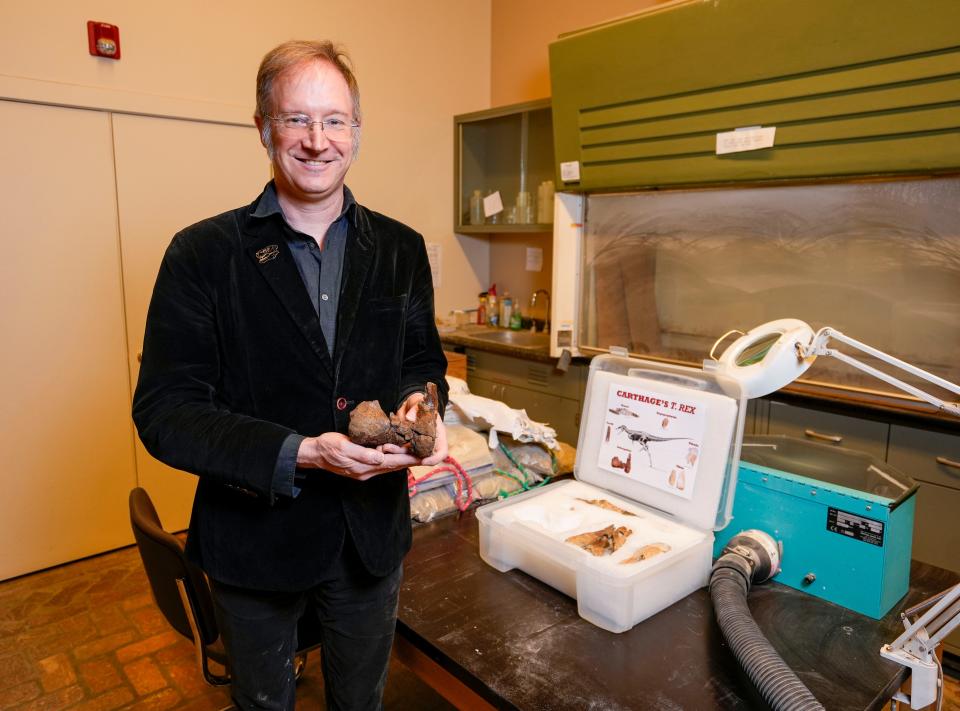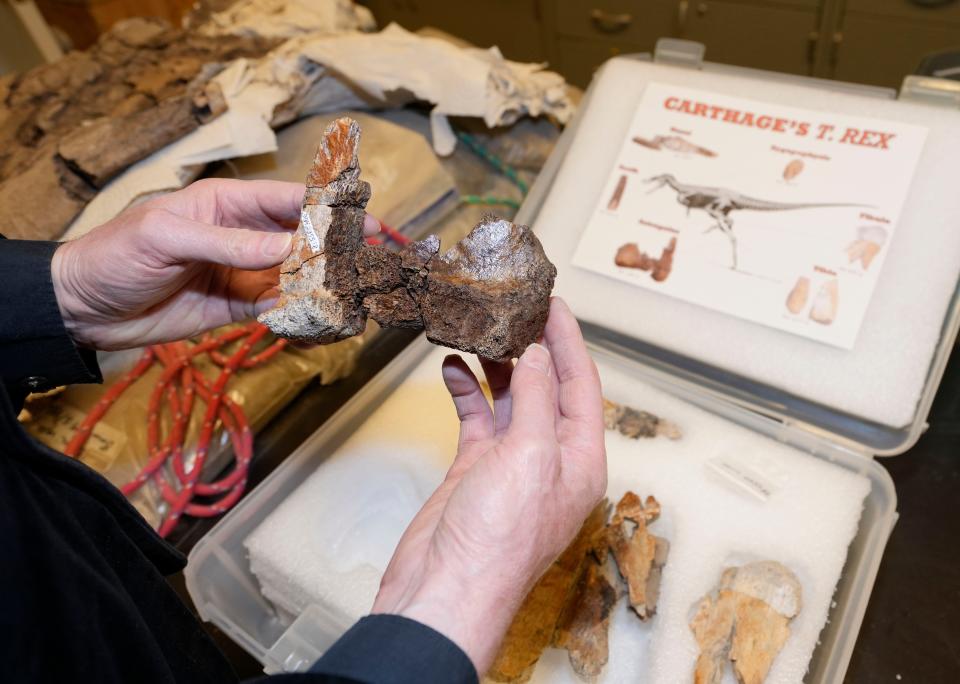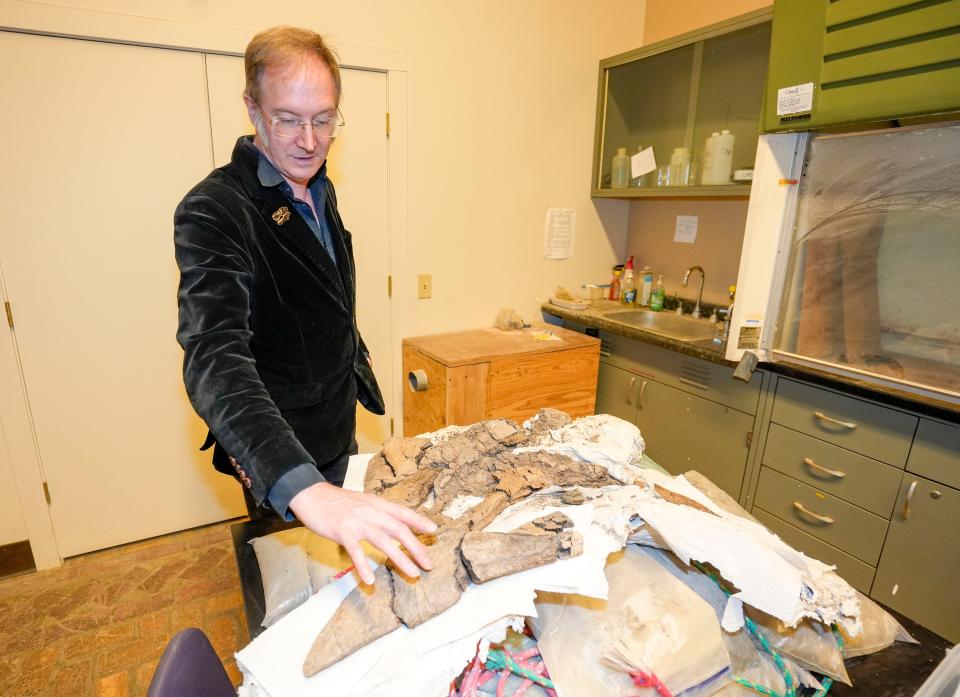Two years after juvenile T. rex discovery, rare college paleontology program vulnerable
It was the second to last day in the field two years ago.
During the heat of a Montana summer, the Carthage Institute of Paleontology was excavating skeletons. Volunteer Mason Wojtyla walked over to Thomas Carr, the head of the program, to report he found something.

“Photograph it in place, bag it, tag it and pick up all the bits,” Carr said to Wojtyla, not suspecting anything unusual. The crew of 15 staff, students and volunteers routinely discovers pieces of leaves, invertebrate teeth and turtle shells.
Carr didn’t open Wojtyla’s bag of fossils until after dinner that night, back at base camp. He grew quiet as he picked through the bones.
“He knew what he was looking at, but until he spoke, none of the rest of us knew,” said Megan Seitz, former preparator for the Institute and co-leader of the program with Carr. “Normally, when he looks through a bag of fragments like that with a volunteer, he’s usually kind of vocal, telling everybody what he’s seeing.”
Carr finally told them the contents: pieces from the leg and shin of a juvenile Tyrannosaurus rex.
There was an explosion around the dinner table. One of four juvenile T. rex skeletons in the world had just been discovered.

Now, despite the cachet of such a recent discovery, the paleontology program is losing funding for its preparator position in August. The preparator is responsible for running the lab, curating the collection and training students to handle fossils.
Seitz left the position in May so it's just sitting open as the money officially runs out. She said she loved working at the Institute, but finding another preparator position is relatively difficult, so she took an opportunity at the Dinosaur Journey Museum in Fruita, Colorado, as soon as it opened up.
Carthage College originally removed the funding for the position in 2020, part of a series of cuts during the height of the COVID-19 pandemic. A grant from the Bureau of Land Management and the David B. Jones Foundation funded the position for the next four years. Now, that's ending.
“It's an absolutely critical function. It's a full-time job. And part of the deal that I had with the college is that we would do this; this is one of our services (to students),” Carr said.
The crew is heading back to Montana
The Carthage Institute of Paleontology is the result of a partnership between the college and the city of Kenosha. It’s housed at the Dinosaur Discovery Museum in Kenosha.
Carr and a group of volunteers and Carthage students will return to Montana — where they discovered pieces of the shin, ankle, snout and vertebrae of the juvenile T. rex — on June 29. They hope to find more of the skeleton.
The crew is scheduled to spend about a month in the field, working long days that begin and end with an hour-and-a-half hike. If they find what’s called an articulated skeleton — a large section of bones that are still together — they have to protect it with a huge plaster jacket that might need to get airlifted out of the dig site.
Because funding for the preparator position doesn’t expire until August, Carr is using that money to hire a field assistant to help co-lead the expedition. Two people are needed to drive the vans and watch over the dig site, he said.

However, without a preparator to curate the collection at the Dinosaur Discovery Museum, whatever they find this summer cannot be properly maintained.
“Let’s say we find the whole T. rex, the most scientifically important thing to ever happen to this museum. What happens to it?" Carr said.
Without a preparator to curate the fossil collection, the Dinosaur Discovery Museum is at risk of losing its status as a federal repository, just as Carthage students will miss out on lab and field experiences.
The pieces of the juvenile T. rex discovered in 2022 contributed to a May 2023 publication of a comparative study of tyrannosaur legs and feet. Juvenile skeletal remains are especially rare because they’re smaller, and therefore harder to find.
“Imagine if all we knew about people came from the skeletons of teenagers and adults. And that's it. That means that everything before the age of 12 is completely unknown. So every little scrap tells us something that was completely unknown,” Carr said.
The most famous juvenile T. rex is a skeleton nicknamed Jane, on display at the Burpee Museum in Rockford, Illinois. Carr estimates that the Carthage T. rex is about a year or two younger than Jane, which is “new territory.”
“From there, we can study how T. rex evolved — how growth was altered to produce the unique features we see in different species that make them different,” he explained.
Students benefit from research, field work, lab
Carthage College hired Carr in 2004 to design the gallery at the Dinosaur Discovery Museum and kickstart the lab and field programs for the paleontology program. Carr leads the research leg; the college hired Seitz as preparator in 2006.
In the back rooms of the paleontology lab at Kenosha’s Dinosaur Discovery Museum, Seitz has individually bagged and catalogued rows of fossils. Most students arrive at the lab with no experience handling fossils, Seitz said, and she was responsible for teaching them how to clean the fossils without breaking them.
Carr said he can't alone provide the field work or lab work that is promised to students.
“We're competitive because we can offer those three things: research, field work, lab,” Carr explained.
An undergraduate paleontology program is relatively rare, especially in the Midwest. The Carthage program trains students from an evolutionary biology perspective, rather than geology. Comparable programs exist at University of Michigan, University of Chicago and Montana State University, Carr said.
“What we know is that our students or graduates have gotten into grad school and gotten full-time jobs in paleo because they've had all three legs of the stool,” Carr said. “They do land on their feet.”
A June 13 statement from the provost's office said the decision to not fund the preparator position was made back in 2020 "as part of a greater effort to keep Carthage affordable."
"Carthage must carefully evaluate all expenses so we can continue to deliver transformative and affordable education to our students," the statement continued. "That sometimes means making difficult choices about which positions to fund through the college vs. external resources. Our grants office continues to work with Dr. Carr to identify potential new grants so the preparator position can continue."
Amelia Zietlow is a graduate of the paleontology program at Carthage now working on her doctorate at the Richard Gilder Graduate School of the American Museum of Natural History in New York. As a high schooler, she found Carthage College simply by googling “paleontology in Wisconsin.”
“I didn't know if I wanted to live far from home, and this is something that I never would have done if it was not in the state,” she said.
Though the program was small, Zietlow was dedicated. During her time at Carthage, she volunteered regularly in the lab, went out to the field in Montana and co-founded a paleontology club. The club sponsored paleontology students to present their research at conferences, at which Zietlow said she was often asked if she was a graduate student.
“We're undergrads, but you know, that's a testament to the quality of the research training that we get there,” she said.
After hearing about the loss of preparator funding, Zietlow wrote a letter on X with the “goal to reach someone with the resources to help.”
“For the past four years, Carthage and Kenosha have both managed to take advantage of Dr. Seitz’s invaluable contributions to the (Institute) without paying her a cent themselves," she wrote in the letter.
Further, she said in the letter," dozens of ongoing dig sites in Montana will be left incomplete and their fossils lost to the elements.”
Twenty-six students and volunteers signed the letter. Former students and current faculty have also met with Carthage administration multiple times to discuss the situation, Zietlow said.
Accrediting organization has been put on alert
The paleontology program is a concentration within the biology major at Carthage; last year, 15 students identified paleontology as their concentration. But Carr said he does not hide the department’s situation from interested students or parents.
Neither does he hide the funding loss from museum accreditors. The Paleontological Resources Preservation Act provides specific mandates for the curation of fossil specimens in museum collections. Without a preparator, Kenosha’s Dinosaur Discovery Museum does not meet those mandates, Carr said. Because the fossils were collected on public land managed by the Bureau of Land Management, they are at risk of being seized by the federal government and relocated.
In addition, the Dinosaur Discovery Museum is accredited by the American Alliance of Museums, which also requires a curator that knows the collection. Carr said he contacted the AAM to let it know about Carthage's situation.
“We got a reply saying that next time they come up for accreditation, that will be taken into consideration. They’re on alert,” he said.
“When (Seitz) was here, people would come look through those windows and see people doing science,” Carr said.
Without a preparator, the paleontology lab often sits empty.
“I just think especially nowadays with so much science denial and other garbage happening in the post-COVID political landscape," Zietlow said, "I think it's really important for people to get these hands-on, see-how-science-actually-is-done experiences, especially in the Midwest … where you can’t just walk out into a field and find a dinosaur.”
Contact Kathryn Muchnick at KMuchnick@gannett.com or 812-568-4468.
This article originally appeared on Milwaukee Journal Sentinel: In 2022, students found rare dinosaur. Why is their program at risk?

